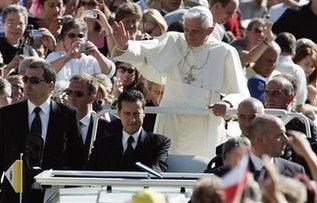 Pope Benedict arrived in an open "Popemobile" and conducted his Wednesday General Audience in the open air of St. Peter's Square despite many death threats against him.
Pope Benedict arrived in an open "Popemobile" and conducted his Wednesday General Audience in the open air of St. Peter's Square despite many death threats against him.Religion and Reason, Not Religion and Violence, Go Together
General Audience, September 20, 2006
His Holiness Pope Benedict XVI
Dear brothers and sisters, I wish today to turn my thoughts back to various moments of my pastoral voyage to Bavaria, which the Lord allowed me to fulfill last week. * * *
[On] Sunday, I celebrated the Holy Mass in the open area adjoining Munich's New Fair grounds among the faithful who came from various parts of Germany. On the basis of the Gospel text for that day, I reminded everyone that there is a 'deafness to God' from which we suffer particularly today. It is our task as Christians in a secularized world to proclaim and be witness to the message of hope that our faith offers us: in the crucified Jesus, God the merciful Father calls on us to be His sons and to overcome every form of hate and violence in order to contribute to the definitive victory of love.
"Make yourselves strong in the faith" was the theme of my encounter in the afternoon with First Communicants of Munich and their families and catechists, as well as pastoral workers and others who do pastoral work together in the archdiocese of Monaco.
Together we celebrated Vespers at the famous Liebfraauendom, the Cathedral of our Beloved Lady, which houses the relics of St. Benno, patron of Munich, and where I was ordained a bishop in 1977. I reminded both children and adults, that God is not far form us, in some unreachable part of the universe. That, on the contrary, through Jesus, He came to us to establish with each of us a friendship. Every Christian community, and the parish in particular, thanks to the constant commitment of its members, is called on to be a great family able to walk together along the path of true life. * * *
In Regensburg, whose diocese was established by St. Boniface in 739 and has as its patron another Bavarian saint, Bishop Wolfgang, there were three important events.
In the morning, at the mass in Islinger Field, we reflected once more on the theme of the visit, on the symbol of the faith. God who is our Father wishes to gather together, through Jesus Christ, all of mankind in one family, the Church. That is why he who believes is never alone. He who believes need not fear coming to a dead end from which there is no way out. * * *
An experience that was particularly beautiful for me that day was to deliver the opening lecture of the academic year before an audience of professors and students at the University of Regensburg, where I taught as a professor for several years. It was with joy that I found myself once more in the university world, which for a long period of my life, had been my spiritual homeland.
I chose as my theme the relationship between faith and reason. To introduce the audience to the drama and the actual relevance of this issue, I quoted some words from a dialog between a Christian and a Muslim in the 15th century. In it, the Byzantine emperor Manuel II Paleologos - in a manner that for us was incomprehensibly blunt - presented to his Muslim interlocutor the problem of the relation between religion and violence.
The quotation, unfortunately, lent itself to being misunderstood. For the attentive reader of my text, however, it would be clear that I never intended to make mine the words pronounced by the medieval emperor in that dialog, and that its polemical content is not my personal conviction. My intention was altogether different. Taking off from what Manuel II himself said subsequently in a positive way, with a beautiful sentence about the rationality that should guide the transmission of faith, I wished to show that not religion and violence, but religion and reason, go together.
The topic of my lecture, corresponding to the mission of a university, was therefore the relation between faith and reason. I wished to invite a dialog of the Christian faith with the modern world and a dialog among all cultures and religions.
I hope that in various occasions during my visit - for instance, in Monaco, where I underscored how important it is to respect what is sacred to others - had made clear my profound respect for the great religions, particularly that of Muslims, who "adore the one God" and with whom we are committed to "defend and promote together, for all men, social justice, moral values, peace and freedom. (Nostro Aetate, 3). I trust therefore that after the initial reactions, my words at the University of Regensburg could constitute an impulse and an encouragement for a positive dialog, even self-critical, among religions as well as between modern reason and the faith of Christians. * * *
In the departure ceremony, thanking once more all who had worked to make the visit possible, I reaffirmed its ultimate purpose: to bring the attention of my fellow Bavarians once more to the eternal truths of the Gospel and confirm among the faithful their adherence to Christ, Son of God incarnate, who died and resurrected for us.
May Mary, Mother of the Church, help us to open our hearts and minds to Him who is "the Way, the Truth and the Life" (Jn 14,16). For this I prayed, and for this I invite all of you, dear brothers and sisters, to continue to pray, as I thank you from the heart for the affection with which you accompany me daily in my ministry. I thank you all.
No comments:
Post a Comment